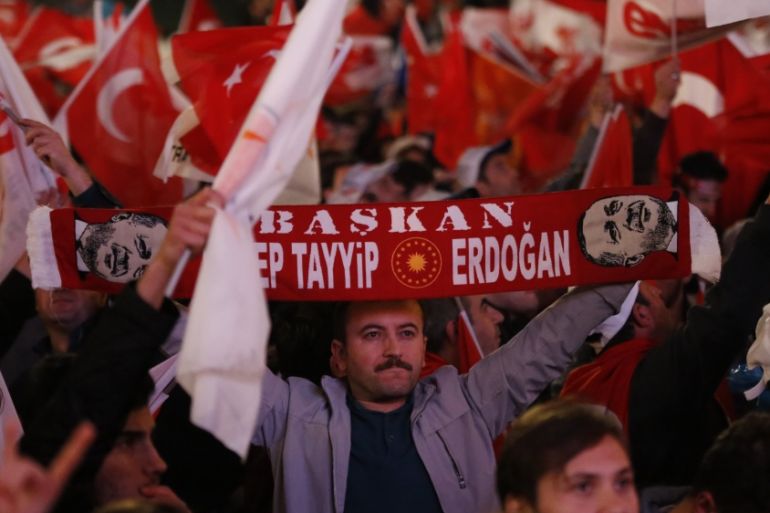President Erdogan rejects criticism of referendum
Sunday’s vote was conducted on an ‘unlevel playing field’, a criticism termed ‘prejudiced’ and ‘unacceptable’.

President Recep Tayyip Erdogan told international election observers on Monday to “talk to the hand” after they criticised the conduct of Turkey’s referendum, saying it was held on an “unlevel playing field”.
Sunday’s narrow referendum victory gave the Turkish president sweeping powers. Unofficial results, which the opposition said it would challenge, showed a narrow victory with 51.4 percent of votes cast in favour of the “Yes” campaign.
Keep reading
list of 4 itemsTurkish opposition wins major cities in local elections
What shapes Turkey’s municipal elections?
Turkey offers to host Russia-Ukraine peace talks as Erdogan hosts Zelenskyy
Erdogan said concentrating power in the hands of the president was vital to prevent instability, adding that the “Yes” vote had ended all debate on forging a stronger presidency.
|
|
“The crusader mentality in the West and its servants at home have attacked us,” he told a crowd as he arrived at Ankara airport, in response to the vote monitors’ assessment.
“We neither see, hear, nor acknowledge the political reports you’ll prepare,” Erdogan said later at the palace.
“We’ll continue on our path. Talk to the hand. This country has carried out the most democratic elections, not seen anywhere in the West.”
The new constitutional changes transform Turkey’s governance from a parliamentary system to an executive presidency, significantly expanding the powers of the top office.
Earlier on Monday, the Organization for Security and Cooperation in Europe (OSCE) said a “lack of equal opportunities, one-sided media coverage, and limitations on fundamental freedoms” had created an “unlevel playing field” in Turkey’s vote.
“In general, the referendum did not live up to Council of Europe standards. The legal framework was inadequate for the holding of a genuinely democratic process,” said Cezar Florin Preda, head of the delegation from the Parliamentary Assembly of the Council of Europe.
In response, Turkey’s Foreign Ministry labelled the comments “prejudiced” and “unacceptable”.
“The assessment that suggests that the referendum process fell short of international standards is unacceptable,” it said in a statement, blasting the monitors as “biased”.
READ MORE: Recep Tayyip Erdogan hails referendum victory
The ministry said that the statements made by OSCE officials before the referendum showed they “arrived in Turkey with prejudices and … disregarded the principles of objectivity and impartiality”.
Turkey’s voter turnout rate of 85 percent “could serve as an example to other OSCE participating states”, the ministry added.
The main opposition Republican People’s Party demanded a recount, citing voting irregularities. There were demonstrations in various parts of Istanbul challenging the results.
The referendum gives the president to be elected in 2019 new powers to appoint vice-presidents, ministers, high-level officials, and senior judges.
It will also allow the president to dissolve parliament, issue executive decrees, and impose states of emergency.
|
|